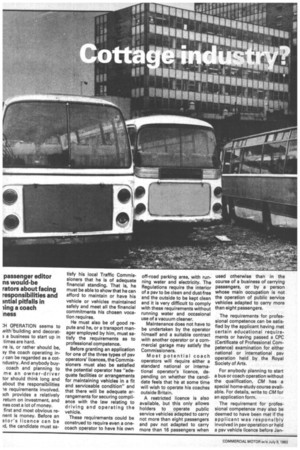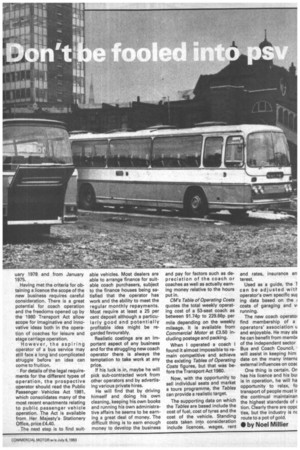passenger editor ns would-be rators about facing responsibilities and mtial pitfalls in ling a coach ness
Page 28

Page 29

If you've noticed an error in this article please click here to report it so we can fix it.
:H OPERATION seems to rvith building and decorata business to start up in times are hard.
re is, or rather should be, 3y the coach operating in/ can be regarded as a cotndustry. And anybody buy coach and planning to me an owner-driver tor should think long and about the responsibilities le requirements involved. )ch provides a relatively return on investment, and nes cost a lot of money. first and most obvious renent is money. Before an ator's licence can be !d, the candidate must sa
tisfy his local Traffic Commissioners that he is of adequate financial standing. That is, he must be able to show that he can afford to maintain or have his vehicle or vehicles maintained safely and meet all the financial commitments his chosen vocation requires.
He must also be of good repute and he, or a transport manager employed by him, must satisfy the requirements as to professional competence.
Before granting an application for one of the three types of psv operators' licences, the Commissioners must also be satisfied the potential operator has "adequate facilities or arrangements for maintaining vehicles in a fit and serviceable condition" and that there will be adequate arrangements for securing compliance with the law relating to driving and operating the vehicle.
These requirements could be construed to require even a onecoach operator to have his own off-road parking area, with running water and electricity. The Regulations require the interior of a psv to be clean and dust-free and the outside to be kept clean and it is very difficult to comply with these requirements without running water and occasional use of a vacuum cleaner.
Maintenance does not have to be undertaken by the operator himself and a suitable contract with another operator or a commercial garage may satisfy the Commissioners.
Most potential coach operators will require either a standard national or international operator's licence, depending on whether the candidate feels that he at some time will wish to operate his coaches outside Britain.
A restricted licence is also available, but this only allows holders to operate public service vehicles adapted to carry not more than eight passengers and psv not adapted to carry more than 16 passengers when used otherwise than in the course of a business of carrying passengers, or by a person whose main occupation is not the operation of public service vehicles adapted to carry more than eight passengers.
The requirements for professional competence can be satisfied by the applicant having met certain educational requirements or having passed a CPC (Certificate of Professional Competence) examination for either national or international psv operation held by the Royal Society of Arts.
For anybody planning to start a bus or coach operation without the qualification, CM has a special home-study course available. For details, write to CM for an application form.
The requirement for professional competence may also be deemed to have been met if the applicant was responsibly involved in psv operation or held a psv vehicle licence before Jan uary 1978 and from January 1975.
Having met the criteria for obtaining a licence the scope of the new business requires careful consideration. There is a great potential for coach operation and the freedoms opened up by the 1980 Transport Act allow scope for imaginative and innovative ideas both in the operation of coaches for leisure and stage carriage operation.
However, the aspiring operator of a bus service may still face a long and complicated struggle before an idea can come to fruition.
For details of the legal requirements for the different types of operation, the prospective operator should read the Public Passenger Vehicles Act 1981, which consolidates many of the most recent enactments relating to public passenger vehicle operation. The Act is available from Her Majesty's Stationery Office, price £4.40.
The next step is to find suit
able vehicles. Most dealers are able to arrange finance for suitable coach purchasers, subject to the finance houses being satisfied that the operator has work and the ability to meet the regular monthly repayments. Most require at least a 25 per cent deposit although a particularly good and potentially profitable idea might be regarded favourably.
Realistic costings are an important aspect of any business and for the struggling new coach operator there is always the temptation to take work at any price.
If his luck is in, maybe he will pick sub-contracted work from other operators and by advertising various private hires.
He will find that by driving himself and doing his own cleaning, keeping his own books and running his own administrative affairs he seems to be earning a great deal of money. The difficult thing is to earn enough money to develop the business and pay for factors such as depreciation of the coach or coaches as well as actually earning money relative to the hours put in.
CM'S Table of Operating Costs quotes the total weekly operating cost of a 53-seat coach as between 91.74p to 229.66p per mile depending on the weekly mileage. It is available from Commercial Motor at £3.50 including postage and packing.
When I operated a coach I found it almost impossible to remain competitive and achieve the existing Tables of Operating Costs figures, but that was before the Transport Act 1980.
Now, with the opportunity to sell individual seats and market a tours programme, the Tables can provide a realistic target.
The supporting data on which the Tables are based include the cost of fuel, cost of tyres and the cost of the vehicle. Standing costs taken into consideration include licences, wages, rent and rates, insurance an terest.
Used as a guide, the 7 can be adjusted with operator's own specific sul ing data based on the costs of garaging and vi running.
The new coach operatoi find membership of a operators' association u and enjoyable. He may als he can benefit from memb( of the independent sector Bus and Coach Council, will assist in keeping him date on the many internE external influences on coac One thing is certain. On has his licence and his bul is in operation, he will ha opportunity to relax, fo transport of people must ir the continual maintainan the highest standards of ( tion. Clearly there are oppc ties, but the industry is nc route to a pot of gold.
0 by Noel Millier




















































































